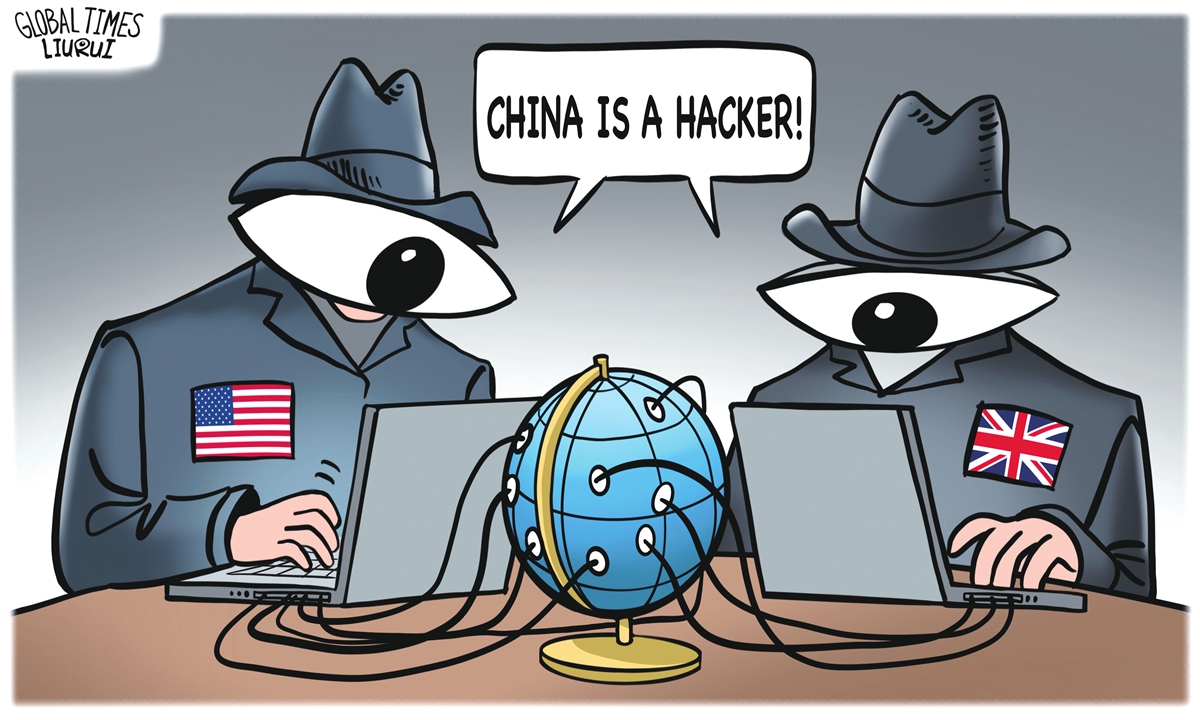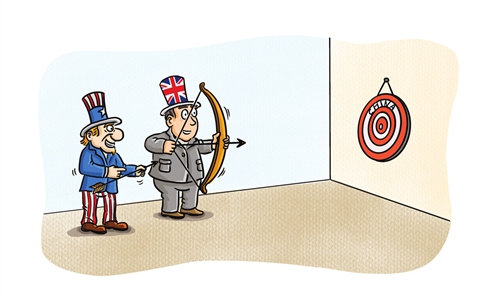
Illustration: Liu Rui/GT
On Monday, the UK and the US falsely accused China of carrying out cyber attacks and imposed sanctions on China. Subsequently, Australia and New Zealand also came forward to jointly accuse China of orchestrating a so-called sweeping campaign of cyber espionage. Last year, the Canadian Foreign Ministry slandered China for conducting cyber attacks against Canada. There is no doubt that this is another collective smear campaign against China by the Five Eyes alliance. This "witch-hunt," typical of Western zero-sum mentality, stirs up wave after wave of "China threat" theory for election purposes and is a tragedy for Western democracy.According to The Times, UK Deputy Prime Minister Oliver Dowden has accused China of being behind a string of cyberattacks on British politicians. Subsequently, the US, Australia and New Zealand have also accused China of conducting cyber espionage activities against the West, attributing domestic cyberattacks to China. The accusations from the Five Eyes alliance are clearly a malicious slander against China. In response to the so-called hacker cyberattacks, a spokesperson from the Chinese Ministry of Foreign Affairs responded, "When investigating and determining the nature of cyber cases, one needs to have adequate and objective evidence, instead of smearing other countries when facts do not exist, much less politicize cybersecurity issues."
The Five Eyes alliance is making baseless accusations without evidence and making frequent statements without proof, which inevitably raises suspicions about whether it is a coordinated political manipulation.
Li Haidong, a professor at the Institute of International Relations at the China Foreign Affairs University, told the Global Times that this is a typical practice of the Five Eyes alliance in conducting intelligence warfare against China. By spreading rumors, fabricating facts, and distorting the truth to smear their opponents, they are engaging in blatant distortion and defamation attacks to lay the groundwork for more intense anti-China policies in the future and to build political consensus domestically and even among the Five Eyes alliance countries. In the typical Western zero-sum mind-set, Western countries will not let go of any country that poses a potential or substantial challenge to their global status. This applies to the intelligence field as well as to economics, technology and cultural exchanges.
In the eyes of the Five Eyes alliance, the online world and digital data are strategic resources for competition. Shen Yi, director of the International Research Institute of Global Cyberspace Governance at Fudan University, believes that the demonization of China by the Five Eyes alliance is simply to establish a hegemonic order in cyberspace.
As is well known, the Five Eyes alliance is the world's largest intelligence organization, with the "big brother" US being the world's largest "hacker empire." For a long time, the US has violated international law and the basic norms of international relations by carrying out large-scale, organized, indiscriminate network espionage, surveillance, and attacks against foreign governments, enterprises and individuals. From WikiLeaks, Edward Snowden, the Swiss spy encryption machine, to the use of third-country intelligence agencies to steal information from European heads of state, and other malicious acts, these actions are well known to the world. In terms of cybersecurity, the US and the West have a long history of misconduct and are in no position to dictate to other countries. Therefore, some observers have expressed that the cybersecurity responsibilities of the Five Eyes alliance toward China are like a "cuttlefish strategy" trying to muddy the waters.
Four years ago, China put forward the Global Initiative on Data Security, which calls on countries to jointly build a cyberspace featuring peace, security, openness, cooperation and a sound order and not use information technology to undermine other countries' critical infrastructure, steal important data and endanger their national security and public interests. Chinese Foreign Ministry spokesperson Wang Wenbin once said, "If 'the Five Eyes alliance' truly wants to keep cyberspace safe, they are welcome to join the Global Initiative on Data Security."
In this political farce involving the Five Eyes alliance, what we see is the anxiety, lack of confidence, and psychological imbalance of the US and its Western allies. In the waves of attacks and smears on China, Western politicians have shown a kind of madness and pathology. The real threat faced by Western countries comes from within, and blaming China and trying to cure internal problems by external means is completely the wrong path to take. In order to divert voters' attention from domestic issues, Western political elites have created a narrative of "democracy vs. authoritarianism," packaging the smearing of China as an epic competition and confrontation. In reality, these so-called democratic politicians in Western countries often wear the cloak of democracy while committing anti-democratic acts themselves. No matter how Western political elites try to confuse right and wrong and create camp-based opposition, they cannot hide the extremely destructive things they have done in the name of democracy.
The Five Eyes alliance conducts surveillance, reconnaissance, and monitoring on countries outside the alliance and still owes the world an explanation. If the Five Eyes alliance wants to safeguard cybersecurity, they should not hypocritically accuse others while walking further down the path of smearing, spreading rumors and poisoning the world.


